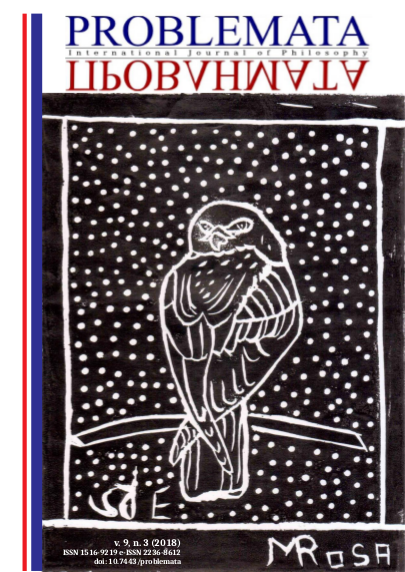APPOINTMENTS ABOUT THE CONCEPT OF GAME FROM ITS PRACTICE IN THE TEACHING OF PHILOSOPHY
DOI:
https://doi.org/10.7443/problemata.v9i3.41667Keywords:
Games, Philosophy, Teaching-learning, Didactic materials.Abstract
The present article is the beginning of a research in progress and it has as a starting point the activities realized with playing games in the high school philosophy’s classes at CEFET/RJ and, notably, with the extention project “Philosophy in building games”, which is registered at the same institution since 2013. In effect, the games production practice – as part of bimonthly evaluation in the discipline and also as the disseminative action of philosophical knowledge in the school community – puts into question the collective production of alternative didactic materials for the high schools philosophy’s classes throughout the participation of all concerned, and also the possibilities to evaluate the ellaborated products thorough the process of its construction and its culmination. The answer to attempt these questions brought the necessity of profound consideration about playing and its educational use. In this way, to advance the discussion about the use of games as a profitable material for the teaching-learning process, it is proposed to preliminarily analyse the game’s concept, in view of its practice in the teaching of philosophy. For this task, some conceptual aspects present in the game will be approached, which take a possible aim of proximity with philosophy. So, the following will be analysed: (1) the space demarcated by game through playing; (2) the own order that is opened to participants of a game, both analysed by Johan Huizinga. After that, the concepts of (3) common space, and (4) articulation, developed by the philosopher Charles Taylor, will be examined too. The initial hypothesis in this work is that games can have a philosophical treatment which gives support to their use in the teaching-learning process, and won’t be restricted to a facilitation tool in the transmition of contents to be acquired.
Downloads
References
CAILLOIS, Roger. Os jogos e os homens: a máscara e a vertigem. Lisboa: Cotovia, 1990.
DETERDING, Sebastian et al. “Gamification: using game design elements in non-gaming contexts”. In Conference on human factors in computing systems, Vancouver, 2011. p. 1-4. Disponível em <http://gamificationresearch.org/wp-content/uploads/2011/04/01-Deterding-Sicart-Nacke-OHara-Dixon.pdf>. Acesso em maio de 2017.
DUFLO, Colas. Jouer et philosopher. Paris: PUF, 1997.
______. O jogo: de Pascal a Schiller. Porto Alegre: Artes Médicas, 1999.
HUIZINGA, Johan. Homo ludens: o jogo como elemento da cultura. São Paulo: Perspectiva, 2012.
LARROSA, Jorge. Tremores: escritos sobre experiência. Belo Horizonte: Autêntica, 2016.
PORTA, Mario Ariel González. A filosofia a partir de seus problemas: didática e metodologia do estudo filosófico. 4. ed. São Paulo: Edições Loyola, 2014.
TAYLOR, Charles. What is human agency?. In Philosophical papers. v. 1. Cambridge: Cambridge University Press, 1985. p. 15-44.
______. A política liberal e a esfera pública. In Argumentos filosóficos. São Paulo: Loyola, 2000. p. 275-304.
Downloads
Published
Issue
Section
License
Authors who publish with this journal agree to the following terms:
- Authors retain copyright and grant the journal right of first publication with the work simultaneously licensed under a Creative Commons Attribution License that allows others to share the work with an acknowledgement of the work's authorship and initial publication in this journal.
- Authors are able to enter into separate, additional contractual arrangements for the non-exclusive distribution of the journal's published version of the work (e.g., post it to an institutional repository or publish it in a book), with an acknowledgement of its initial publication in this journal.
-
- Authors are permitted and encouraged to post their work online (e.g., in institutional repositories or on their website) prior to and during the submission process, as it can lead to productive exchanges, as well as earlier and greater citation of published work (See The Effect of Open Access).





